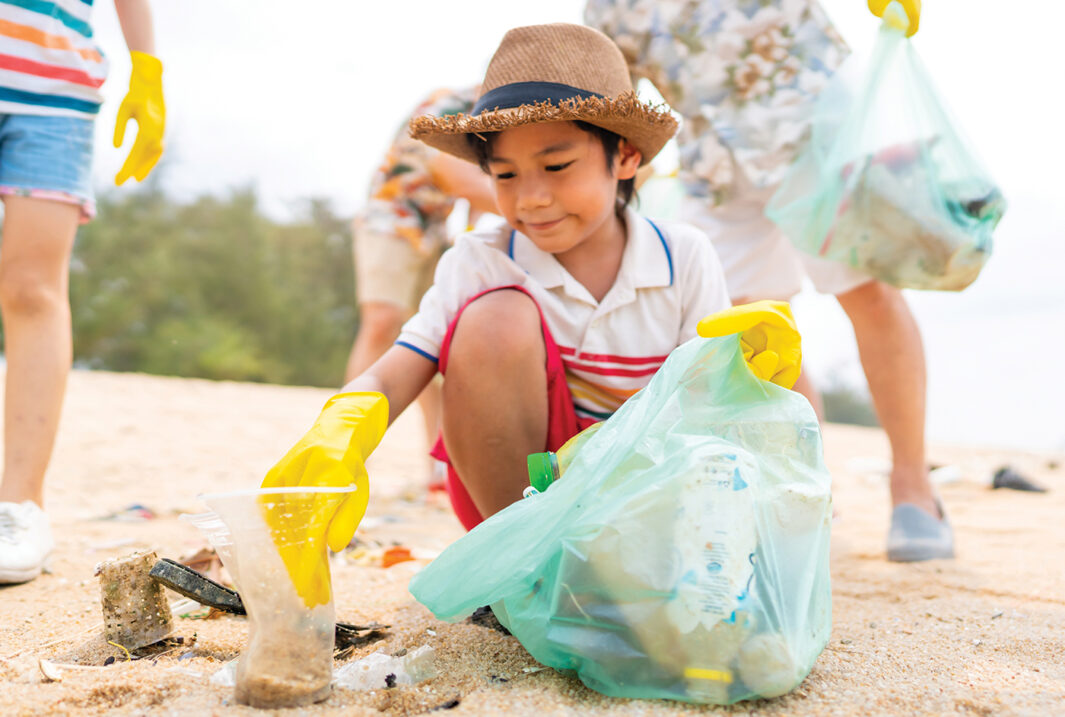
While protecting Mobile Bay may seem like a HUGE task for grown ups, let alone our youngest readers, there are some amazingly simple things kids can do to save our most precious natural resource. The best part? Kids who are educated about environmental issues and take action now will grow up to be adults who care about the Bay and make choices with nature in mind.

1. Kick the trash
Don’t be a litter bug
Every granola bar wrapper, plastic straw or grocery bag that is left on the ground causes problems for wildlife and water quality (Google the sea turtle with a straw up his nose!). Often trash left in the back of pickup trucks will fly out, so be sure your parents always secure cups and wrappers properly before driving off!
Pick up after others
We know you didn’t leave that mess, but let’s come together and clean it up. You can join a cleanup to tackle a particular stretch of road or patch of beach, leaving it better for the next visitor… and the full-time furry and finned residents that call
it home.
Fishing Line
Fishing line is made to be strong so you can successfully fight and land that fish. However, when your lure gets snagged and you just cut the line and leave it, some poor creature will likely end up entangled and hurt. Always dispose of fishing line properly, away from water and marshland.
If things don’t change, By 2050, there will be more trash than fish in the ocean. For every one fish you catch you might catch 5 pieces of trash when you grow up!
Did you know?
Our Bay is an estuary where saltwater meets freshwater. it’s Home to the Mobile-Tensaw Delta, which is the second largest Delta in the United States.
The delta, one of the largest wetland ecosystems in the world, is also called “America’s Amazon.” The term was coined by E.O. Wilson, a renowned ecologist who was born and raised in Mobile, left to study other ecosystems, then returned to Mobile because of its beauty and diversity.
2. Chemical spills
You can’t always see chemicals in the water or on the ground, but you usually can smell them. Just add a few drops of vinegar to a cup of water to get the idea! Make sure that your home is not adding to all the chemicals going into our environment every day.
Fix that Leak
If your family’s car leaks oil on the ground or your boat leaks in the water, show it to an adult! Kitty litter is great at soaking up oil in the driveway, and there are homemade booms you can make to catch oil spilled in waterways. After you clean up the spill, remind your family to fix the leak!
Fertilizers and Pesticides
Always make sure your family uses the right amount (or less!) of backyard chemicals. Many fertilizers and pesticides come concentrated, meaning they are supposed to be watered down before use. In this case, more is not better! Excessive chemicals can run off your patch of green grass and go straight to a stream or the bay, creating algal blooms or killing fish, small birds and beneficial bugs like butterflies.
7% of sea grass habitat is lost worldwide per year according to the United Nations

3. Runoff
While you might not be a construction foreman (yet!), all of us can help keep an eye on the projects happening near our homes. You should see sandbags and black fencing around all piles of dirt or bulldozed pieces of land. Dirt washing off construction sites can cause streams and rivers to turn brown or orange (yuck!) and will eventually end up in the Bay.
What is turbidity?
Turbidity is muddy, milky water that you can’t see through. If you can’t see through the water, no light is getting in, the grasses and plants can’t get sunlight, the oxygen levels will be low and the marine life is suffering. Turbidity is a big problem in Mobile Bay, and greatly affects the health of the oysters and sea grass, two things that the bay needs to survive and grow healthy fish, shrimp and other creatures.
Oyster babies have trouble finding somewhere to settle and attach because the hard rock surface they need is buried underneath silt from runoff
Did you know?
Seagrass can’t grow with high turbidity because it blocks the sunlight. Seagrass in mobile bay decreased by 1,371 acres from 2002 to 2009.
4. Bacteria
When to swim
Bacteria occurs naturally pretty much everywhere — in the water, on the dirt, even inside your body! But too much bacteria — especially of the wrong kinds –— can cause big problems for the environment and for your own health! When the Port City and surrounding towns get big rains -— which happen A LOT — the sewers and drains get overwhelmed. They overflow and spew their nasty contents right into the water. Who wants to swim in that? It’s important to always check the water quality before you swim or eat the fish you catch.
Ask your parents to download the Swim Guide app to their phones. It’s a one-stop shop for information about water and beach quality, so you always know when it’s safe. Local organizations, like Mobile Baykeeper, regularly test local beaches and swimming holes for all kinds of bacteria and pollutants. Get real time info with an easy to understand red or green icon!
Don’t swim after big thunderstorms for at least 24 hours. Just assume it is going to be a mess. In addition to overflows and spills, big rains, wind and waves kicks up things that have been lying dormant in the watershed that might not be good for our bodies.
From 2020 – 2022, an average of 20 million gallons of sewage spilled in the bay area





